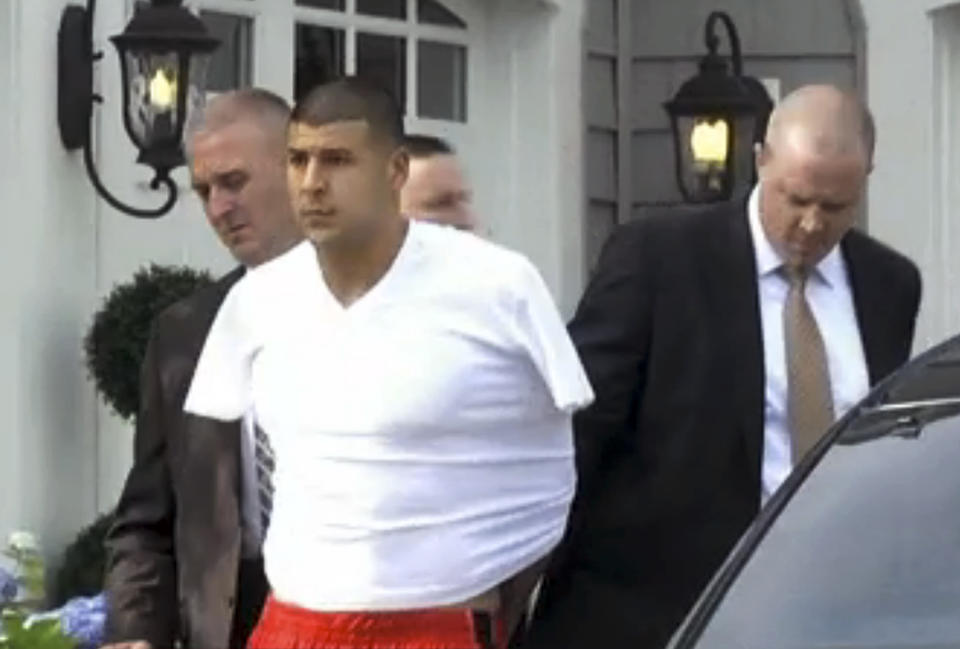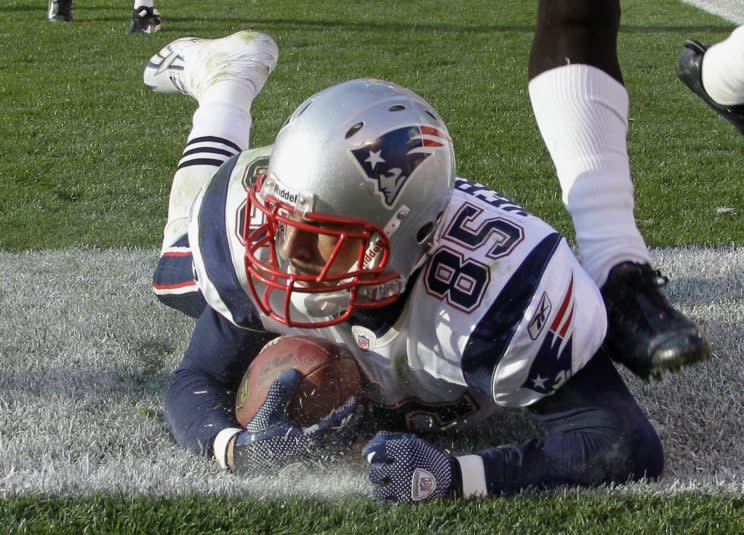It's hard to reconcile two sides of Aaron Hernandez
The lasting image that many Americans have of Aaron Hernandez is of the budding New England Patriots star, his white T-shirt stretched over his upper body and handcuffed arms, as he was taken from the large house he shared with his fiancée and baby daughter in North Attleborough, Mass., on the morning of June 26, 2013.
It’s the image of when he was being arrested for the murder of Odin Lloyd, a friend and semi-pro football player from Boston.

But as a former Patriots beat writer, there are other images I have in my mind, and whenever Hernandez’s name is brought up, they begin to replay: of a smiling Hernandez, his white Patriots practice jersey wet with the sweat of a training camp workout, wrestling with the young sons of a team staffer. It’s clear the boys adore Hernandez, and he loves every minute of playing with them.
It’s almost four years later, and it’s still hard to reconcile those two mental films, those seemingly polar opposite men.
The assassin and the animated big brother.
The convicted killer and the charming buddy.
Early on Wednesday morning, Massachusetts State Corrections officials say Hernandez committed suicide in his prison cell, hanging himself with his bed sheet. It was just a few days after a jury declared Hernandez not guilty of killing Safiro Furtado and Daniel de Abreu in a drive-by shooting in 2012, though Hernandez was still set to spend the rest of his life in prison for his conviction in the Lloyd case.
I covered the Patriots for almost a decade; in 2010, I was with the Boston Globe when the Patriots drafted Hernandez in the fourth round of the draft. Hernandez’s NFL career was short – he played three seasons before his arrest – but I was there for it all.
As a reporter, I wasn’t close to Hernandez, but really no one was. He spent little to no time with his New England teammates outside of the team facility, opting to flee to his hometown of Bristol, Conn., a two-plus hour drive to the west, whenever he could.
When he was drafted, it was clear that Hernandez was immature. He was 20 at the time, one of the youngest players ever drafted into the NFL. But still, he had significant question marks that caused him to fall in the draft: multiple failed drug tests with the Florida Gators, the nightclub bouncer he allegedly punched in the head, a shooting outside of a Gainesville, Fla., nightclub he was tied to but never charged in.
But his talent was undeniable, and the Patriots felt like they’d gotten a bargain, snagging a first-round talent with a fourth-round pick.
Hernandez could be moody, and in public anyway, he certainly wasn’t like up-for-anything party boy Rob Gronkowski, his draft classmate and fellow tight end. In 2012, after Gronkowski had appeared on the cover of ESPN the Magazine’s Body Issue in nothing but giant Hulk hands and a smile, one of his many adventures that led to many of us calling it the “Summer of Gronk,” Hernandez was asked how he spent his free time and quipped, “I had my own kind of fun.”
As it turns out, that was just a few weeks after Furtado and Abreu died. Hernandez may not have been their killer, but there seems no doubt he was present when they were shot.

In August that year, at the Patriots’ huge annual fundraiser in the closing days of training camp, the team announced a contract extension for Hernandez, rewarding him and ensuring he and Gronkowski would be playing together for years to come.
That night, with a small circle of reporters and cameras surrounding him, Hernandez was emotional. He spoke of the gratitude he felt toward Patriots owner Robert Kraft, head coach Bill Belichick and the entire organization for taking a chance on him. He told us his longtime girlfriend was pregnant. He said it was time to leave the old Aaron behind, to become a role model for the Hispanic community. He donated $50,000 of his new money to Kraft’s family foundation in appreciation.
As he spoke, he kept trying to hold eye contact with me, as though he needed assurance that it was OK to be emotional, to show a vulnerable side of himself.
His daughter, Avielle, was born on his 23rd birthday, in November. Chatting at his locker a couple of days after she made her arrival, Hernandez told me he couldn’t ask for his life to be much better, and again said it was time to put his “young and reckless” days behind him.
Seven months later, Hernandez was arrested in the death of Lloyd, who was shot in an industrial park not far from Hernandez’s home.
Sad is a small word, but there aren’t many other words that fit the entire scope of the Hernandez situation better.
Sad for beautiful little Avielle, who will one day read the stories of her father’s terrible misdeeds and the end of his life in a prison cell.
Sad for his older brother, D.J., and mother, Terri, who must have so many questions about what went wrong and whether either of them could have done anything to save their brother and son.
Sad for the friends and families of Odin Lloyd, Safiro Furtado and Daniel de Abreu, who will spend the rest of their days grieving men who were violently taken from them.
And, yes, sad for Aaron Hernandez. It is possible to abhor and condemn the things he did and feel some sympathy for him – after Hernandez’s father, Dennis, died unexpectedly of surgical complications when Hernandez was 16, he lost his way and never regained it. He acknowledged that he had everything and still couldn’t stop himself from throwing it all away and ruining innumerable lives in the process. What if he’d gotten grief counseling or hadn’t fallen in with an awful crowd after Dennis died?
Maybe things would have been different. Maybe they wouldn’t have.
More Aaron Hernandez coverage from Yahoo Sports:
• Hernandez commits suicide in prison cell
• Dan Wetzel: Slight change in Hernandez during his final days
• Hernandez’s agent skeptical of prison suicide
• Prison: Hernandez showed no suicidal signs, left no note
• Watch: The life and death of Aaron Hernandez



